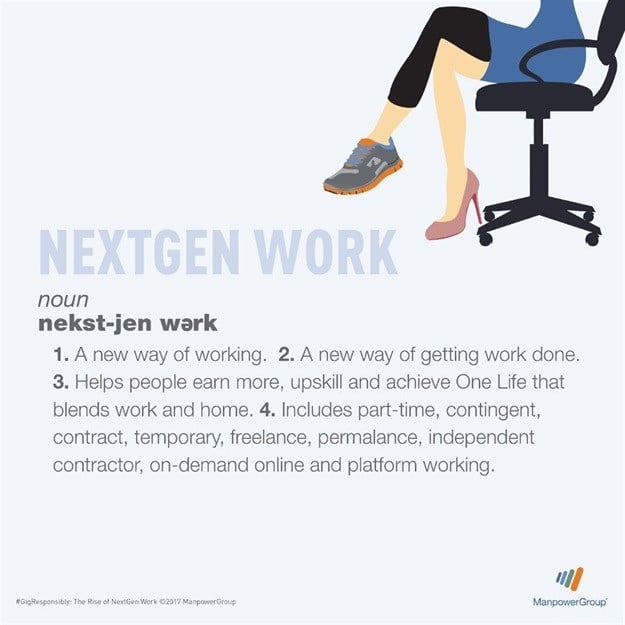#BizTrends2018: The rise and rise of NextGen Work
As labour markets dynamics continue to shift rapidly and the lifespan of skills becomes ever shorter, the gap between the skills that people have and those that employers need is widening. At the same time, what people want is changing, giving way to alternative ways of working. The number of people seeking flexible, non-traditional ways of working is significantly greater. People and business continue to look for new ways to get work done. Today more people than ever want 'NextGen Work'.
NextGen Work: Noun: 1. A new way of working. 2. A new way of getting work done. 3. Helps people earn more, upskill and achieve One Life that blends work and home. Examples include part-time, contingent, contract, temporary, freelance, permalance (essentially a permanent freelancer), independent contractor, on-demand online and platform working.
So, what are the top trends that make up the rise of NextGen Work?

- Learnability is key
Learnability can be simply defined as the desire and ability to learn new skills, in order to be employable for the long-term. People want opportunities to develop in-demand skills that will keep them employable for this job and the next, and they want work styles that better balance responsibilities, upskilling and reskilling.
- Cash is King
For many, NextGen Work helps supplement salaries, savings or pensions, so people can find the time and money to do the things they value most. For others, NextGen Work allows them to use in-demand skills and earn higher salaries for highly skilled contract positions.
- Work life balance
The lines between home life and work life are increasingly blurred, so people are choosing more flexible work models that make it easier for them to manage and enjoy their personal lives. In certain roles, people can also control where, when and how they work – thereby reducing stress and allowing flexibility for a positive work life balance.
- Age makes a difference
Younger millennials (18-24) are new to the labour market and want swift progression — they prize pay, learning and career advancement. They see NextGen Work as a way to help them move on and up.
Older millennials (25-34) are most driven by career advancement and learning new skills, but they are also starting to value balance and meaningful work almost as much as pay.
Younger Gen X Workers (35-39) are most focused on work-life balance, with some choosing to career plateau while they put family first and log-off at the end of the day.
Older Gen X Workers (40-49) increasingly prioritise meaningful work and feeling appreciated by their employer, while pay, learning new skills and providing for children become less important.
Boomers (50-65) get a second wind: with proven experience and fewer family obligations, they are choosing encore careers, some for pleasure, others to supplement pensions. They are more focused on quality — they want recognition for a job well done and work that’s meaningful.
- Benefits must followBenefits that were once tied to jobs, now need to be NextGen too. They must be able to travel across portfolio careers whether that’s certifications, pensions, training funds and more.
In conclusion, business leaders and policy makers must collaborate to find the best balance of flexibility and responsibility in order to enable NextGen Work.
About Lyndy van den Barselaar
Lyndy van den Barselaar is the MD of Manpower Group South Africa.
























































